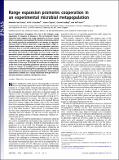Range expansion promotes cooperation in an experimental microbial metapopulation
Author(s)
Datta, Manoshi Sen; Korolev, Kirill Sergeevich; Dudley, Carmel R.; Gore, Jeff; Cvijovic, Ivana
DownloadDatta-2013-Range expansion promotes cooperation in an experimental microbial metapopulation.pdf (756.0Kb)
PUBLISHER_POLICY
Publisher Policy
Article is made available in accordance with the publisher's policy and may be subject to US copyright law. Please refer to the publisher's site for terms of use.
Terms of use
Metadata
Show full item recordAbstract
Natural populations throughout the tree of life undergo range expansions in response to changes in the environment. Recent theoretical work suggests that range expansions can have a strong effect on evolution, even leading to the fixation of deleterious alleles that would normally be outcompeted in the absence of migration. However, little is known about how range expansions might influence alleles under frequency- or density-dependent selection. Moreover, there is very little experimental evidence to complement existing theory, since expanding populations are difficult to study in the natural environment. In this study, we have used a yeast experimental system to explore the effect of range expansions on the maintenance of cooperative behaviors, which commonly display frequency- and density-dependent selection and are widespread in nature. We found that range expansions favor the maintenance of cooperation in two ways: (i) through the enrichment of cooperators at the front of the expanding population and (ii) by allowing cooperators to “outrun” an invading wave of defectors. In this system, cooperation is enhanced through the coupling of population ecology and evolutionary dynamics in expanding populations, thus providing experimental evidence for a unique mechanism through which cooperative behaviors could be maintained in nature.
Date issued
2013-04Department
Massachusetts Institute of Technology. Computational and Systems Biology Program; Massachusetts Institute of Technology. Department of PhysicsJournal
Proceedings of the National Academy of Sciences
Publisher
National Academy of Sciences (U.S.)
Citation
Datta, M. S., K. S. Korolev, I. Cvijovic, C. Dudley, and J. Gore. “Range expansion promotes cooperation in an experimental microbial metapopulation.” Proceedings of the National Academy of Sciences 110, no. 18 (April 30, 2013): 7354-7359.
Version: Final published version
ISSN
0027-8424
1091-6490